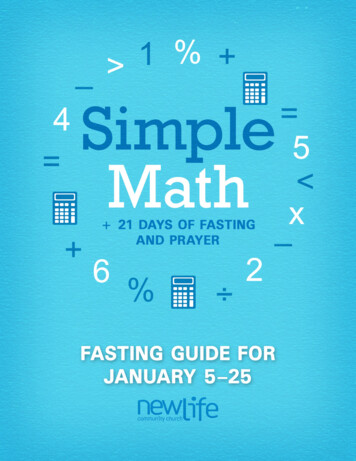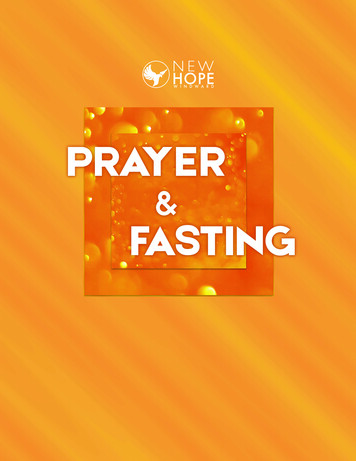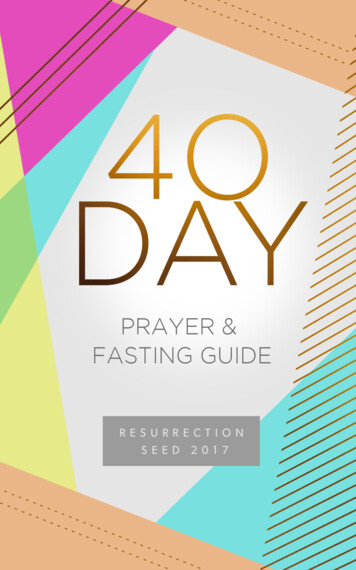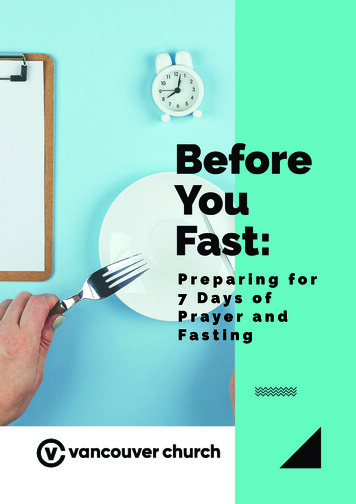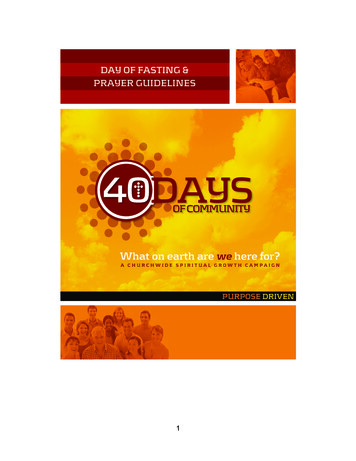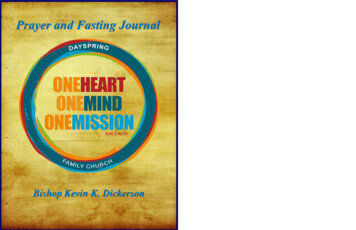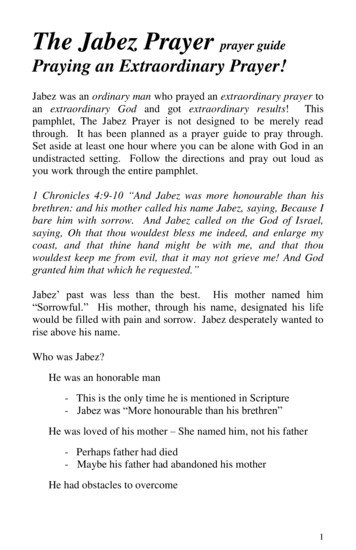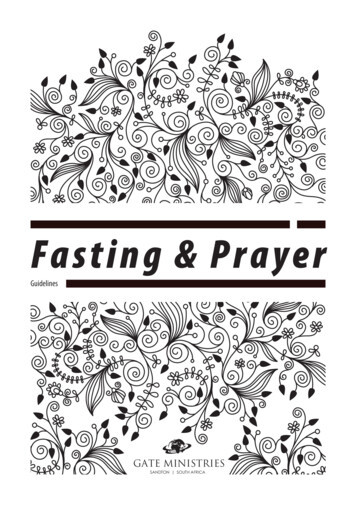
Transcription
Fasti n g & P r a ye rGuidelinesGATE MINISTRIESSANDTON SOUTH AFRICA
FASTINGBy Randolph Barnwell / 20051. PRESENTING “FASTING”Fasting is one of the most neglected spiritual disciplines of our time. In His ‘Sermon on the Mount’, Jesus givesprimacy to three areas of spiritual practice, viz. giving, prayer and fasting (Matthew 6).Of these three areas, the discipline of fasting is probably the most neglected by Christians. Fasting, together withother spiritual disciplines, is key to bringing the Church to maturity and God’s end time purposes on the planet tofinality.It may surprise many people just how much scope and weight the Scriptures accord to the subject of fasting.We have endeavoured to provide explanation and current truth application to most scriptural references on thesubject, by extrapolating Biblical ‘Principles’ for effective fasting and by examining various ‘Persons’ who fastedwith tremendous results.Thus we will explore the value of fasting both by ‘precept’ and by ‘example’. One cannot escape the link between the‘greatness of’ and ‘great exploits’ performed by many mighty men and women of God on the one hand, and theircommitment to the practice of fasting on the other.Examples of people in Scripture are Moses, David, Elijah, Daniel, Ezra, Nehemiah, Esther, Hannah, Anna, John,Jesus, Paul, the Apostles and Cornelius. We shall explore the varied reasons that inspired these saints to fast eitherPRIVATELY for personal reasons or for issues concerning God’s purpose, or PUBLICLY as they sometimes led anentire nation in a fast to effect God’s will on a macro scale.Beyond these biblical examples, believers in Church history like Luther, Calvin, Knox, Wesley, Edwards, Brainerd,Finney and countless others, even up to the present time, continue to unlock doors through fasting where otherkeys have failed.2
2. PARAMETERS OF FASTINGThe Hebrew word for ‘fast’ ‘tsom’, which means ‘TO COVER THE MOUTH’The Greek word for fast ‘nesteia’ means ‘A VOLUNTARY ABSTINENCE FROM FOOD’2.1. FASTING IS THE PRACTICE OF DELIBERATELY ABSTAINING FROM FOOD FOR SPIRITUAL PURPOSESBiblical fasting does not simply constitute an abstinence from food per se, but this voluntary withholding of food isa physical act of ‘restraint’ or ‘self-denial’, so that one could devote oneself more intensely to some spiritual pursuit,practice or Kingdom purpose.In this context, the refusal to eat food in the natural has almost the opposite effect in the spiritual realm. Thephysical body is robbed of vital nourishment, while the spirit man is built up. People who experience prolongedstarvation evidence this food deprivation outwardly by a lean, skeletal and malnourished body.He who fasts deliberately chooses not to eat, and thereby nourishes and builds up his ‘spirit’ posture. Fasting isGod’s chosen way to deepen and strengthen prayer. You will be the poorer spiritually and your God-intendedeffectiveness and potency in prayer will never be realized until you begin practicing the discipline of fasting. [On alighter note: ‘We must not pray fast, but fast and pray’]2.2. FASTING IS NOT THE SAME AS STARVATION OR DIETINGThe objective of Biblical fasting is always spiritual, i.e. to attain some spiritual end. There are physical benefits thatone experiences as a result of fasting (e.g. weight loss, purifying the body, etc.), but these benefits do not motivatethe fast.One’s ‘spiritual hunger’ is so intense that you fast physically to impact the spirit realm, irrespective of the positivephysical bodily results. People who fast usually have no great difficulty in overcoming any temptation to eat, buttalk to a friend who is trying to lose weight through dieting – it is war on every front!2.3. PRIMARILY, FASTING IS ABSTINENCE FROM FOOD, NOT WATERIf fasting is an abstinence from “food,” what constitutes food? Food is defined as follows: nutriment, nourishmentin solid form. Thus eating food and drinking water are two completely different things.3
The perception that true fasting excludes food and water has prevented many believers from experiencing thespiritual rewards of an extended fast, which is impossible without drinking water.On a scriptural level, it is acceptable to drink water when fasting: Paul knew the difference between ‘fasting’ and ‘thirsting’: 2 Corinthian 11:27After His 40 day fast Jesus was hungry, not thirsty: Matthew 4:2 and Luke 4:Towards the end of his fast, satan tempted Jesus to eat, not to drink, for He hadbeen drinking water throughout the fast.After the 3 day fast of the 4000, they were offered food, not water: Mark 8:2,3Elijah fasted 40 days, drinking water only: 1 Kings 19:8On a biological level, it is advisable to drink water when fasting2.4. FAST FROM FOOD AND WATER SHOULD NOT BEYOND THREE DAYSAlthough the root meaning of ‘fast’ indicates abstinence from food not water, there are three incidents in the Biblewhere fasts were undertaken without food and water: Moses twice fasted for 40 days without food and water (Exodus 34:28-29; Deut. 9:9-18) – but it mustbe remembered that Moses was literally “there with the Lord” (verse 28), thus having no need for foodor water. Exodus 34: 28: Deut 9:9,18Esther and the Jews: Esther 4:16Paul (Saul) at his conversion: Acts 9:9Except for Moses’ 40 day fast of this kind, the longest recorded fast without food and water is THREE DAYS. Moseswas able to undertake this ‘absolute’ fast twice for 40 days with virtually no break in between (80 days really),because he was actually in the immediate presence of God. Thus one should not fast without food and water formore than THREE DAYS (or 72 hours).3. PATTERNS OF FASTINGIn Scripture there seems to be varying methods or patterns of fasting. Some went without food only and drankwater; others abstained from both food and water for up to three days; others refrained from eating only specifickinds of foods. For the purposes of understanding and easy identification of various fasting patterns, we have4
classified fasting into three distinct categories.These category labels are not found in the Bible, but they (or some variation thereof) have been used by Biblescholars and believers alike for many generations to describe the particular kind of fast undertaken:Type of FastAbsolute FastDry FastExtreme FastNormal FastWet FastPartial FastDefinitionNo food or wateris taken for amaximum of threedaysNo food is taken,but one drinkswater for as long asup to 40 daysOne abstains fromcertain tasty foodsand drinksScripturalExampleEsther: Esther 4:16;Paul: Acts 9:9Jesus, Elijah, Paul,and many othersDaniel 2; Daniel 10:34. PERIOD OF FASTINGFasting should be practiced on a regular basis as part of one’s normal Christian devotion. A fast of one day in a weekis generally recommended. Paul says concerning his own fasting practice ‘. in fastings, OFTEN ‘ (2 Cor. 11:27).The seriousness and scope of need for which you fast will normally determine its length. It is also important to beled by the Spirit as to when to break the fast (see Jesus’ fast in Matthew 4: ‘led by the Spirit’).Duration of Fasts in Scripture: Part of a Day:One Day:Three Days:Four Days:Dan. 6:18 (King Darius)Lev 23:2; 1 Sam. 7:6, 14:24; Jer. 36:6; Neh.9: 1 (Israel)Matt. 15:32; Mark 8:2,3; Acts 9:9 (Paul); Esther 4:16 (Esther and the Jews)Acts 10:30 (Cornelius)5
Seven Days:Ten Days:Fourteen Days:Twenty-One Days:Forty Days:1 Samuel 31:11-13 (Men of Jabesh-Gilead); 2 Sam. 12:15-18, 21-23 (David)Dan. 1:12-16Acts 27:33 (Paul and crew)Dan. 10:2,3 (Daniel)Ex.34: 28 / Deut 9:9,18 (Moses); 1 Kings 19:8 (Elijah); Matt. 4 & Luke 4 (Jesus)Those who have never fasted before should perhaps start by fasting partially: e.g. Omit breakfast on your chosenfast day; do this on your fast day for four weeks; for the next four weeks, omit breakfast and lunch; for the next fourweeks, omit breakfast, lunch and supper.5. PRIMARY NEW TESTAMENT PASSAGES ON FASTING5.1. FASTING – A MARK OF CHRISTIAN DISCIPLESHIPMark 2:18-20 / Matt. 9:14,15 / Luke 5:33Jesus stated emphatically that his DISCIPLES would fast when He would be taken away from them. In Matt. 6:1-18He stated to his disciples ‘WHEN YOU FAST’ – this is not a suggestion but an implied commandment. In Christiandiscipleship, fasting is not an optional extra – it is indispensable to spiritual growth and the effectiveness of theBeliever. Jesus cited a lack of fasting as one of the reasons why his disciples could not cast a demon out of a boy.5.2. MOTIVES IN FASTINGEssentially Matthew 6 warns about performing spiritual activities to impress men. Jesus isolates two motives infasting: ‘to appear unto men’ OR ‘to appear unto the Father’. The two motives have two different kinds of rewards.Fasting done to impress others with your piety gains the recognition of men, but not of God.Fasting is to be done unto the Lord. Do not go around boasting about your fast; other people may or may not findout; there are times when you are compelled to inform others that you are fasting, but the motive should neverbe to receive commendation from them or increase or maintain your spiritual ‘reputation’ among them. See Luke18:10-14 (also Zechariah 7:5)6
5.3. FASTING: AN EXPRESSION OF WORSHIPWorship is a lifestyle of sincere love and devotion to God expressed in acts of obedience to Him. Fasting is a vitalpart of worship. Anna the prophetess ‘worshipped God with prayers and fasting’ (Luke 2:37). Early church leadersat Antioch also ‘ministered unto the Lord and fasted ’ (Acts 13:1,2)5.4. FASTING – VITAL PART OF THE ORDAINATION OF LEADERSSee Acts 14:235.5. FASTING: A REQUIREMENT FOR MINISTERS AND LEADERSSee 2 Cor. 6:3-10; 11:23-27Paul argues that one of the ways in which he ‘approved’ himself as a minister of God was through fasting.6. PURPOSE OF FASTING6.1. TO DISCIPLINE THE SOULA study of the reasons why different people in the Bible fasted will reveal many and various motives for fasting.(See section on the Product of Fasting). In this section we want to isolate one of the most important reasons forpersonal fasting: to discipline the soul and body.Man is a spirit, has a soul and lives in a body (1 Thess. 5:23/ Heb 4:12). The strength of one’s spirit should dominatethat of the soul and body. The soul is comprised of three parts, viz.The Mind: What and how we think:Our thoughtsThe Will:What I desire/ambitions/etc.:Our IntentionsThe Emotions:How I feel:Our state of wellbeing(psychology)The soul must be renewed on an ongoing basis (Romans 12:1,2). David said that God ‘restores his soul’ (Psalm 23).Fasting is part of God’s program in bringing the soul of man to complete restoration and renewal.7
Three Scriptures speak of fasting to discipline the soul:1.2.3.Lev.16: 31 / Acts 27:9: In the OT, God ordained a day for Israel in which they were to ‘afflict their souls’.From the time of Moses onwards, the Jews have interpreted this as a commandment to fast. In Acts 27:9it is the annual Day of Atonement, which is referred to as ‘the fast’. Presently, under its Hebrew name YomKippur, the Day of Atonement is still observed by Orthodox Jews as a day of fasting.Psalm 35:13: ‘I humbled my soul with fasting’Psalm 69:10: ‘I chastened my soul with fasting’The terms ‘afflict’, ‘humbled’ and ‘chastened’ all imply a disciplining of one’s soul: our thoughts and mindsets needto be brought in line with those of God; our will, desires, intentions, ambitions need to be brought in line with God’sexpectations and desires for us; our emotions need to be brought to the state of wholeness, healing, and maturity.6.2. TO DISCIPLINE THE FLESHLY NATURE: ‘THE BODILY APPETITES’‘The way to a man’s heart is through his stomach’ – satan has been operating by this principle for years. He gainsrulership over man’s heart by appealing to his physical appetites. The first temptation hurled at Eve related to herphysical appetite: ‘she saw that the tree was good for food’ (Genesis 3:6). Noah abused his physical appetite andgot drunk. Esau gave in to his physical craving and sold his birthright.In 1 Cor. 10:6-7 Paul equates the ‘idolatry’ of Israel to ‘eating and drinking’. There was a direct connection betweentheir turning to idols and their inability to control their fleshly appetites. In Phil.3: 19 we are warned to stay clearof people ‘whose god is their belly.’The excessive preoccupation with food and eating in the world today is one of the signs of the impending return ofthe Lord (Matt 24:37,38 and Luke 21:34). It is not so much the actual excessive eating that is alluded to here, butwhat it represents – uncontrolled fleshly lust and craving.Paul said that he brings his body into subjection (1 Cor.9: 27). Jesus conquered where Eve failed: Matt 4:3. Thereis a direct opposition between the Holy Spirit and the carnal nature of man: Gal. 5:17. Withholding food from ourbodies testifies to the dominance we have in our spirit man – fasting ensures victory over the carnal man and itsdesires.Dereck Prince said: ‘Fasting deals with two great barriers to the Holy Spirit that are erected by man’s carnal nature.These are the stubborn self-will of the soul and the insistent, self-gratifying appetites of the body. ‘8
7. FASTING: PREPARATION FOR THE SPIRIT’S POWERNotice the significant difference in the expressions used by Luke to describe Jesus before and after his fast:Before:After:Lk.4: 1:Lk.4: 14:Jesus being FULL OF THE HOLY GHOST Jesus returned IN THE POWER OF THE SPIRITThe potential of the Spirit’s power came to full manifestation in Jesus only after he had completed his fast. Also thiswas the last phase of his ‘preparation’ before His public ministry commenced.To describe the outpouring of the Spirit on the day of Pentecost, Peter quotes Joel 2:28. Where Peter says ‘in thelast days’ in Acts 2:16,17, Joel says ‘it will come to pass afterwards’. In the book of Joel, the outpouring of the Spiritis described in two phases: i) the former rain; ii) the former and latter rain together (see Joel 2:23). The Holy Spirithere is symbolised by rain.From this we may infer that the former rain of the Spirit’s outpouring marked the beginning of the period calledthe last days (which began with the ministry of Jesus and Pentecost), while the latter rain of the Spirit marks theperiod at the close of the last days. We are now living in the period when the last days are drawing to a close.What will cause the Spirit’s outpouring to increase and take the Church from ‘fullness of the Spirit’ to ‘the power ofthe Spirit?’The answer is fasting.Joel said ‘it will come to pass afterwards ’ Afterwards means after something has first taken place. In context ofJoel’s writings, the precondition for the outpouring of the Spirit was united fasting.On three occasions he called the nation to fast: Joel 1:14,2:12,15. It is going to take united prayer and fasting toprecipitate the final fullness of the latter day outpouring of the Spirit.9
8. PRINCIPAL OLD TESTAMENT PASSAGE ON FASTINGISAIAH 58 –This chapter highlights not the act of fasting but the ‘fasted life.’ The act of fasting without a fastedlife is meaningless.8.1. FACTORS THAT PREVENT EFFECTIVE FASTINGISAIAH 58:4, 7, 9,10Wrong attitudes and motives in fasting nullify the effect of the fast.Wrong attitudes: Five sinful attitudes are cited as reasons why God ignored Israel’s fast:8.1.1.‘Finding Pleasure’ (v.3): They found great ‘delight’ in the pleasures of sin in the time of theirfast. Fasting is more than simply withholding food from your body; you have to enter intothe whole spirit of fasting. Willful continuance in sin renders the fast impotent.8.1.2.‘Exacting all your labors’ (v.3.): Implies intimidation andexploitation of hired workmen for financialreward. They deliberately brought grief to others for personal gain. Worse still, is that theycontinued with their daily business schedule without any prayer and without activelyseeking God in the reading/study of His word.8.1.3.The Yoke (v.9): Speaks of ‘legalism and bondage’ (see Gal.5: 1). Avoid a Pharisaic mindset.Also do not fast in legalism – you can be bound by the amount of time you spend fasting,how often you fast, etc. Also this can relate to specific unbiblical expectations we have ofothers.8.1.4.8.1.5.10Putting forth of the finger (v.9): Accusation and Criticism.Essence of fasting is humility; thereforethere is no place for pride that looks down on others as inferiorto yourself (see Luke 18:11,12)Speaking vanity (v.9): Implies deliberate, conscious calculated, precise and excessive wicked speaking. The tongue still remains a reliable test of true spirituality.
Wrong Motives:8.1.6.For Strife and Debate (v.4): ‘For’ indicates a motive. Strife and debate imply contention anddisagreement. In corporate public fasts, it is essential that there is harmony amongst thepeople involved. Guard against disagreement and strife.8.1.7.To Strike with Fists of Wickedness (v.4): Fist implies aggression; Strike indicates a calculatedintent to wound or to injure. And notice that this is described as ‘wickedness.’ An exampleof this is found in 1 Kings 21.8.1.8.To make your voice to be heard on high (v.4.): Implies an attempt to manipulate God intoresponding in a particular way on our behalf. Fasting is not a cure-all or a formula to beemployed to guarantee results. (See David’s seven day fast in 2 Sam12).8.2. PROPER MOTIVES FOR FASTINGISAIAH 58:6, 7The motives listed for the fast that God ‘has chosen’ (v.6) affects all three areas of man, spirit, soul and body.The Spirit:8.2.1.To loose the bands of wickedness (v.6): ‘Bands’ implyenslavement described as ‘wickedness’.Wickedness is more than just ‘sin’. It alludes to an intense degree of ungodliness. Fasting with prayer has the capacity to break or loose the chains of wickedness that are binding a person, institution or nation.The Soul:Emotions8.2.2.To undo heavy burdens (v.6) Emotional Wellness‘Burdens’ something weighty and difficult to carry around. This usually affects our emotional well-being. This not only relates to issues of concern thatcause emotional turmoil, but also to ‘bruises’ of satan in terms of scars inflictedupon our emotions through negative experiences (eg. Abuse, etc). These burdens need to be ‘undone’. Undo ‘to move, loose or shake off’. Consider thefast that God led Elijah on after he became suicidal because of Jezebel’s threats.11
Mind8.2.3.Will8.2.4.(1 Kings 19)To let the oppressed go free (v.6) Mental Wellness‘Oppression’ relates to the ‘mind’.The Hebrew word that which is bruised and brokenresulting in fear and distress (uneasy in mind). A predisposition to distress andfear is unnatural and leads to bondage: note ‘the oppressed must be FREED.’Fasting assists in the deliverance from these ploys of the enemy.To break every yoke (v.6)Yoke speaks of legalism, which restricts decision-making orlimits options in pursuing various alternatives.The Body: (Physical Needs/Issues)8.2.5.To deal bread to the hungry; bring the poor that are castout;cover the naked; not hide ones self from one’s own flesh(v.7) Fasting to meet the practical physical and social needsof ones self or others is biblical.8.3. PROMISES TO THOSE WHO FASTISAIAH 58: 8-14These will simply be listed. Can you see the application 3.7.8.3.8.8.3.9.8.3.10.8.3.11.12Your light will break forth as the morning:Your health will spring forth speedily:The glory of the Lord will be your reward (rearguard):You will call and the Lord will answer:The Lord will guide you continually:The Lord will satisfy your soul in drought:The Lord will make fat your bones:You will be a well-watered garden – a never failing spring:You will build, repair, restore foundations, breaches and paths:You will ride upon the high places on the earth:You will be fed with the heritage of Jacob:v.8v.8v.8v.9v.11v.11v.11v.11v.12v.12v.12
9. PRAYING GOD’S PURPOSE WITH FASTINGSimply not eating is not true biblical fasting. One should spend as much time as possible in prayer and the readingor study of God’s Word.The following passages link the powerful duo, fasting and prayer: Jeremiah 14: 2:Luke 2:37:Acts 13:1-3:Acts 14:23:Acts 10:30:Daniel 9:3:Nehemiah 1:4:Ezra 8:23:Psalm 35:13:Luke 5:33:‘they fast their cry’‘served God with fasting and prayer’‘they fasted and prayed’‘had prayed with fasting’‘I was fasting the ninth hour I prayed’‘to seek by prayer with fasting’‘I sat and fasted and prayed’‘So we fasted and besought our God’‘with fasting and prayer’‘fast often and make many prayers’The following two verses link fasting with reading of the Word of God: Nehemiah 9:1,2: Jeremiah 36:10:‘were assembled with fasting and read in the book of thelaw for a fourth part of the day’‘Go and read in the roll . Upon the fasting day’10. THE PRODUCT OF FASTINGEXAMPLES FROM THE BIBLE10.1.10.2.10.3.10.4.10.5.10.6.10.7.10.8.Power and Direction in leading:Power over the demonic:Safe Passage on a Long & Dangerous Journey:Overcoming mental/emotional problems:Meeting the physical needs of others:Insight into Ministry /Calling:Health and Physical Wellness:Answered Prayer:Moses:The Disciples:Ezra and Co.:Elijah:Widow:Paul:Daniel and Friends:Daniel:ExodusMatthew 17:21Ezra 8:231 Kings 19:4,81 Kings 17:6Acts 9:9Daniel 1:8Daniel 9 and 1013
10.9.Greater Influence in Ministry/Strategic Role:John the Baptist:Luke 1:1510.10.Deliverance from satanic plots to destroy:Esther and Jews:Esther 4:16; 5:210.11.From Barrenness to Fertility and Productivity: Hannah:1 Samuel 1 and 210.12.Upgraded to God’s current move in the earth: Cornelius:Acts 1010.13.Victory over temptation:Jesus:Matthew 410:14.Operating in the Power of the Spirit:Jesus:Luke 4:1,1410.15.Greater degrees of God’s manifest presence:Samuel and Israel: 1 Samuel 7:610.16.Judgement of God averted (with repentance): Nineveh:Jonah 3:5-1010.17.Apostolic Birthing / Direction/ Guidance:Leaders at Antioch: Acts 13:1,210.18.Accessing God’s strategy when surrounded by the enemy:Jehoshophat:2 Chronicles20:1-3011. PHYSICAL ASPECTS OF FASTING1.2.3.4.5.6.7.8.9.14On prolonged fasts, have sufficient sleep.Your body is the temple of the Holy Ghost. Take proper care of your body – keep it healthy – fasting aids inthis.If you are on chronic medication or if you suffer from diseases like diabetes or tuberculosis, it is wise to obtainmedical advice before venturing into a fast that extends beyond a meal or two.You may experience unpleasant symptoms such as dizziness, headaches or nausea in the early phase ofa fast. Biologically, these are symptoms that the fast is overdue. Do not allow your physical discomfort todeter you from your spiritual goal in fasting. After a day or two, these unpleasant physical reactions usuallydisappear.Remember that hunger is partly a matter of habit. In the early stages of a fast, hunger will normally returnat each mealtime. But if you hold out, the sensation of hunger will pass away without your having to eatanything. Sometimes you can fool your stomach by drinking a glass of water instead of eating.Guard against constipation. Before and after fasting, chose meals that will help in this respect (fresh fruit orfruit juices, prunes, dried figs, oatmeal, etc.)Generally, abstain from very strong stimulants like coffee or tea; but do not come into bondage to otherpeople’s theories of fasting. Find a pattern of fasting that suits you best as an individual.Do not go on a complete fast without food and water for more than 3 full days.Break your fast gradually. Begin with meals that are light and easy to digest. The longer you have fasted, themore care you need to take in how you break your fast. Eating too heavily after a fast can produce seriousphysical discomfort and can nullify the physical benefits of the fast. During any fast that exceeds two days,your stomach will shrink. If you train yourself to eat lightly, your stomach will adjust itself accordingly.
FAST” FORWARD YOUR WAYTO GROWTH AND POWERIN GOD TODAY!‘THEY FASTED’On Sinai’s mount, with radiant face,To intercede for heaven’s graceUpon a stubborn wayward raceHe Fasted(Moses)Once lifted from miry clay,When opposition came his wayThis soldier-king would often prayWith Fasting(David)A seer possessed of vision keen,Who told the troubled king his dream,Had light on God’s prophetic schemeThrough Fasting(Daniel)The prophetess in the temple courtBeheld the Babe the two had brought;For Him she longed and prayed and sought,With fasting(Anna)15
He came to break the yoke of sin,But ere his mission could beginHe met the foe and conquered himWhile Fasting(Moses)‘Set these apart’, the Spirit bade.A spring, that soon vast rivers made,Broke ope by men who as they prayedWere Fasting‘So shall they fast when I am gone’;Was this no word to act upon ?Ask countless saints who fought and wonWith fastingWhen we shall stand on that great dayAnd give account, what shall we say,If He should ask us, ‘Did you pray –With Fasting ?’16
HOW SHOULD WE PRAY?1.In the forthcoming week pray for preparation for the week of fasting and prayer and particularly to seek afresh experience and encounter with the Spirit of God.2.Of great importance in desiring quality time with God is not to race through your time with God – set aspecific time that will not be interrupted by any variables.Put the phone on hold. There is no appointment more important than your appointment with the Father, Sonand Holy Spirit. Prioritize your time and set a rope and boundary around; guard it as if your life depends on it.Treat this time seriously but with a sense of joyous pleasure of meeting with the lover of your soul.3.4.Let your communication be conversational, asking the Spirit to wash out the inner sanctuary of the heartthrough the implementation of His Word. This entails reading selected passages of scripture like Psalms 51:119, John 17 and Romans 8. Learn the art of silent meditation and having a listening ear. Meditatively, reflecton the scriptures that you have read or as the Spirit calls to remembrance.5.Begin your prayer time as an act of worship. This is the most neglected aspect of the Christian life. Becauseof a serious lack of disciplined closet praying, prayers become a quick fix and God is viewed only as a utilityprovider. Prayer and worship are integrally linked. Often you can worship without even uttering one word,and still enjoy the presence of God. The highest act of worship is to surrender your heart in humble adorationto God the Father as an offering of love. The heart is the temple of God, where He desires to make a dwellingplace. Inviting Him into the inner sanctuary allows for the intimacy of the fellowship in the Spirit, (Koinoniaof the Spirit). This form of worship is what Father desires, “to worship Him in the human spirit and truth”(God’s Word is the Word incarnate, Jesus Christ).6.Seek to enjoy His presence in intimate union and joyful praise of His holy and perfect nature. Allow your spiritman to experience the witness of the Holy Spirit affirming your love for Him as a child of God. God has sentthe Spirit of His Son into our heart crying “Abba Father”.7.Confess any conviction that you will begin to experience. Trust the Holy Spirit to witness to your spirit-person,the impediments and devices that are hindering your walk with the Spirit. This is important, as the HolySpirit is a gentle but Holy person. Any deeds and thoughts that bring about a conscientious guilt needs to beconfessed and expunged. As you confess your sins, your personality and temperamental issues that causeyou to stumble, realize and accept God’s forgiveness. Then seek forgiveness with those who have probablyoffended you or those who you feel are indebted to you. Set them free. As you do this you will also beliberated from your own captivity and internal bondage. It you have neglected to do something that the HolySpirit was previously prompting within you, now is a good time to seek further counsel from God.17
8.Bask in the assurance of His love and celebrate your sonship by acknowledging your gift of salvation whichhas paved the way of access into His throne (Heb. 4:16), thereby securing all of His providential care forGodliness and life (read 2 Peter 1: 3-4). You can even sing a chorus or two as you feel the leading of theSpirit. If you cannot sing, remember God does not judge our personal worship in the measure of professionalsinging, whether you have the right pitch or voice. Maybe just hum the chorus in your heart, experiencing avery personal time of a love exchange with the Father.9.Ask the Holy Spirit to stimulate and increase your experience and faith with thanksgiving in advance of yourcurrent needs and life’s cares. Let your entire being feast on the glory of His person; as you begin to feel thewarmth of His embrace begin to intercede for others who are in need of God’s help. This is an important taskof closet praying, praying for others who do not enjoy the same relationship with the Father and intercedingfor them.WHAT SHOULD WE PRAY FOR?1.Intercede for the church, its corporate community life and responsibility of ministries. Pray for all churchesir respective of their doctrine or creed, nationality or ethnicity. Don’t demonize those whom you feel areerroneous, let God be the judge, our duty is to sincerely pray. Pray for all leaders who carry the responsibilityof providing care and leadership.2.Pray that this message of the Apostolic will go viral and become visible and infiltrate the Global Church,restoring the Church to the original biblical blue print.3.Pray a covering over your home and family. Begin to also sense a leading of the Spirit as to how to intercedefor some of the issues that are hindering the atmosphere of love and security in the family home. Commit yourfamily members individually by name. Proclaim and speak prophetic words of promise and encouragement.4.Remember relatives near and far, especially those that do not belong to the redeemed family of God. Praylike Abraham prayed for Sodom and Gomorrah. The prayer of a right
Fasting is one of the most neglected spiritual disciplines of our time. In His ‘Sermon on the Mount’, Jesus gives primacy to three areas of spiritual practice, viz. giving, prayer and fasting (Matthew 6). Of these three areas, the discipline of fasting is probably the most neglect
